Hypothyroidism is a condition where the body doesn’t make enough thyroid hormones.
Thyroid hormones help control your growth, repair and metabolism. As a result, people who suffer from hypothyroidism may experience tiredness, hair loss, weight gain, feeling cold, feeling down and many more symptoms (1).
Hypothyroidism affects 1 to 2% of people worldwide and is ten times more likely to affect women than men (2).
Foods alone won’t cure hypothyroidism. However, a combination of the right nutrients and medication can help restore thyroid function and minimize your symptoms.
This article helps you discover the best diet for hypothyroidism, including which foods to eat and which to avoid — all based on research.
What Is Hypothyroidism?
The thyroid gland is a small, butterfly-shaped gland that sits near the base of your neck.
It makes and stores thyroid hormones that affect nearly every cell in your body (3).
When the thyroid gland receives a signal, called TSH (thyroid-stimulating hormone), it releases thyroid hormones into the bloodstream. This signal is sent from the pituitary gland, a small gland found at the base of your brain, when thyroid hormone levels are low (4).
Occasionally, the thyroid gland doesn’t release thyroid hormones, even when there is plenty of TSH. This is called primary hypothyroidism and is the most common type of hypothyroidism.
Approximately 90% of primary hypothyroidism is caused by Hashimoto’s thyroiditis, an autoimmune disease where your immune system mistakenly attacks your thyroid gland (5).
Other causes of primary hypothyroidism are an iodine deficiency, a genetic disorder, taking certain medications and surgery that removes part of the thyroid (6).
Other times the thyroid gland does not receive enough TSH, the signal to release more thyroid hormone. This happens when the pituitary gland is not working properly and is called secondary hypothyroidism.
Thyroid hormones are very important. They help control your growth, repair and metabolism — a process where your body converts what you eat into energy.
Your metabolism affects your temperature and how fast you burn calories. That’s why people with hypothyroidism often feel cold, fatigued and may gain weight easily (1).
SUMMARY:Hypothyroidism is a condition where the thyroid gland does not make enough thyroid hormone. As the thyroid hormone is important for growth, repair and metabolism, people with hypothyroidism may often feel cold, fatigued and may gain weight easily.
How Does Hypothyroidism Affect Your Metabolism?
The thyroid hormone helps control the speed of your metabolism. The faster your metabolism, the more calories your body will burn at rest.
People who have hypothyroidism make less thyroid hormone. This means they have a slower metabolism and burn fewer calories at rest.
Having a slow metabolism comes with several health risks. It may leave you tired, increase your blood cholesterol levels and make it harder for you to lose weight (7).
If you find it difficult to maintain your weight with hypothyroidism, try doing moderate- or high-intensity cardio. This includes exercises like fast-paced walking, running, hiking and rowing.
Research shows that moderate- to high-intensity aerobic exercise may help boost your thyroid hormone levels. In turn, this may help speed up your metabolism (8, 9).
People with hypothyroidism might also benefit from increasing their protein intake. Research shows that higher protein diets help increase the speed of your metabolism (10).
SUMMARY:People with hypothyroidism usually have a slower metabolism. Research shows that aerobic exercise can help boost your thyroid hormone levels. Additionally, eating more protein may help boost your metabolism.
Which Nutrients Are Important?
There are several nutrients that are important for optimal thyroid health.
Iodine
Iodine is an essential mineral that is needed to make thyroid hormones. Thus, people with an iodine deficiency might be at risk of hypothyroidism (11).
Iodine deficiency is very common and affects nearly a third of the world’s population. However, it’s less common in people from developed countries like the US, as they can avoid an iodine deficiency by adding iodized table salt to their foods (12).
If you do have an iodine deficiency, add iodized table salt to your meals or eat more iodine-rich foods like seaweed, fish, dairy and eggs.
Iodine supplements are not necessary as you can get plenty iodine from your diet. Some studies have also shown that too much may damage the thyroid gland (13).
Selenium
Selenium helps the body “activate” thyroid hormones so they can be used by the body (14).
This essential mineral also has antioxidant benefits, which means it may protect the thyroid gland from damage by molecules called free radicals (15).
Adding selenium-rich foods to your diet is a great way to boost your selenium levels. This includes Brazil nuts, tuna, sardines, eggs, and legumes.
However, avoid taking a selenium supplement unless advised by your doctor. Supplements provide large doses, and selenium may be toxic in large amounts (16, 17).
Zinc
Like selenium, zinc also helps the body “activate” thyroid hormones (18).
Studies also show that zinc may help the body regulate TSH, the hormone that tells the thyroid gland to release thyroid hormones (19).
Zinc deficiencies are rare in developed countries, as zinc is abundant in the food supply.
Nonetheless, if you have hypothyroidism, you should aim to eat more zinc-rich foods like oysters and other shellfish, beef and chicken.
SUMMARY:Research shows that iodine, selenium and zinc are especially beneficial for someone with hypothyroidism. However, it’s best to avoid iodine and selenium supplements unless your doctor advises you to take them.
Which Nutrients Are Harmful?
There are several nutrients that may be harmful to someone with hypothyroidism.
Goitrogens
Goitrogens are compounds that may interfere with the normal function of the thyroid gland.
They get their name from the term “goiter,” which is an enlarged thyroid gland that may occur with hypothyroidism (20).
Surprisingly, many everyday foods contain goitrogens. These include (21):
- Soy foods: Tofu, tempeh, edamame, etc.
- Certain vegetables: Cabbage, broccoli, kale, cauliflower, spinach, etc.
- Fruits and starchy plants: Sweet potatoes, cassava, peaches, strawberries, etc.
- Nuts and seeds: Millet, pine nuts, peanuts, etc.
So in theory, people with hypothyroidism should avoid goitrogens. However, this only seems to be an issue for people who have an iodine deficiency or eat large amounts of goitrogens (22, 23, 24, 25).
Also, cooking foods with goitrogens may “inactivate” the goitrogenic substances (21).
One exception to the above foods is pearl millet. Some studies have found that pearl millet might interfere with thyroid function, even if you don’t have an iodine deficiency (26).
Gluten
Gluten is a protein found in grains like wheat, rye and barley.
People who have celiac disease, an autoimmune disease, can’t eat gluten. Their body mistakenly attacks it and causes damage to the surrounding gut area (27).
Unfortunately, research shows that people who have an autoimmune disease are at risk of developing another autoimmune disease (28).
That’s why some people who have Hashimoto’s thyroiditis, the main cause of hypothyroidism, may also have celiac disease (29, 30).
This also means that some people who have Hashimoto’s thyroiditis might need to remove gluten to help improve their symptoms.
SUMMARY:Two substances that may harm your thyroid are goitrogens and gluten. Goitrogens may interfere with your normal thyroid function, while some people with hypothyroidism may also suffer from celiac disease.
Foods to Avoid
Fortunately, there aren’t many foods that you need to avoid if you have hypothyroidism.
However, foods that contain goitrogens should be eaten in moderation and ideally cooked.
You should also avoid eating highly processed foods, as they usually contain more calories. This can be a problem for someone with hypothyroidism, since they may gain weight easily.
Here is a list of foods and supplements you should avoid completely:
- Millet: All varieties.
- Highly processed foods: Hot dogs, cakes, cookies, etc.
- Supplements: Selenium and iodine supplements should be avoided unless prescribed by your doctor.
Here is a list of foods you can eat in moderation. These foods have goitrogens or are known irritants if consumed in large amounts.
- Foods that contain gluten: Bread, pasta, cereals, beer, etc.
- Soy foods: Tofu, tempeh, edamame beans, soy milk, etc.
- Cruciferous vegetables: Broccoli, kale, spinach, cabbage, etc.
- Certain fruits: Peaches, pears and strawberries.
- Beverages: Coffee, green tea and alcohol — these beverages may irritate your thyroid gland (31, 32, 33).
If you have celiac disease because of Hashimoto’s thyroiditis or feel uncomfortable eating foods that contain gluten, then you should avoid gluten completely.
SUMMARY:People with hypothyroidism should avoid millet, processed foods and supplements like selenium and zinc (unless advised by their doctor). Foods that contain gluten and goitrogens are fine in moderate amounts unless they cause discomfort.
Foods to Eat
There are plenty of food options for people with hypothyroidism, including the following:
- Eggs: Whole eggs are best, as much of the iodine and selenium are found in the yolk, while the whites are full of protein.
- Meats: All meats, including lamb, beef, chicken, etc.
- Fish: All seafood, including salmon, tuna, halibut, shrimp, etc.
- Vegetables: All vegetables are fine to eat. Cruciferous vegetables are fine to eat in moderate amounts, especially when cooked.
- Fruits: All other fruits including berries, bananas, oranges, tomatoes, etc.
- Gluten-free grains and seeds: Rice, buckwheat, quinoa, chia seeds and flaxseed.
- Dairy: All dairy products including milk, cheese, yogurt, etc.
- Beverages: Water and other non-caffeinated beverages.
People with hypothyroidism should eat a diet based around vegetables, fruit and lean meats. They are low in calories and very filling, which may help prevent weight gain.
SUMMARY:People with hypothyroidism have plenty of options for a healthy diet. They can eat eggs, meats, fish, most fruit and vegetables, gluten-free grains and seeds, dairy and non-caffeinated beverages.
Sample Meal Plan
Here is a week-long meal plan for someone with hypothyroidism.
It provides a healthy amount of protein, has a low to moderate amount of carbs and should help you maintain a healthy weight.
Make sure you take your thyroid medication at least one to two hours before your first meal or as advised by your doctor. Nutrients like fiber, calcium and iron may stop your body from absorbing the thyroid medication properly (34).
Monday
- Breakfast: Gluten-free bread with eggs.
- Lunch: Chicken salad with 2–3 Brazil nuts.
- Dinner: Stir-fried chicken and vegetables served with rice.
Tuesday
- Breakfast: Oatmeal with 1/4 cup (31 grams) of berries.
- Lunch: Grilled salmon salad.
- Dinner: Fish baked with lemon, thyme and black pepper served with a side of steamed vegetables.
Wednesday
- Breakfast: Gluten-free bread with eggs.
- Lunch: Leftovers from dinner.
- Dinner: Shrimp skewers served with a quinoa salad.
Thursday
- Breakfast: Overnight chia seed pudding — 2 tbsp (28 grams) chia seeds, 1 cup (240 ml) Greek yogurt and 1/2 tsp vanilla extract with sliced fruits of your choice. Let sit in a bowl or mason jar overnight.
- Lunch: Leftovers from dinner.
- Dinner: Roast lamb served with steamed vegetables.
Friday
- Breakfast: Banana-berry smoothie.
- Lunch: Gluten-free chicken salad sandwich.
- Dinner: Pork fajitas — sliced lean pork, bell peppers and salsa served in corn tortillas.
Saturday
- Breakfast: Egg, mushroom and zucchini frittata.
- Lunch: Tuna and boiled egg salad.
- Dinner: Homemade gluten-free Mediterranean pizza topped with tomato paste, olives and feta cheese.
Sunday
- Breakfast: Omelet with various vegetables.
- Lunch: Quinoa salad with green vegetables and nuts.
- Dinner: Grilled steak with a side salad.
SUMMARY:This is a sample week-long meal plan for someone with hypothyroidism. It provides you with plenty of options for a delicious and healthy menu.
Tips for Maintaining a Healthy Weight
It’s very easy to gain weight with hypothyroidism due to a slow metabolism.
Here are a few tips to help you maintain a healthy weight.
- Get plenty of rest: Aim for 7 to 8 hours of sleep every night. Sleeping less than this is linked with fat gain, especially around the belly area (35).
- Practice mindful eating: Paying attention to what you're eating, why you’re eating and how fast you’re eating can help you develop a better relationship with food. Studies also show that it can help you lose weight (36, 37).
- Try yoga or meditation: Yoga and meditation can help you de-stress and improve your overall health. Research also shows that they are effective at helping you maintain a healthy weight (38).
- Try a low to moderate carb diet: Eating a low to moderate amount of carbs is very effective for maintaining a healthy weight. However, avoid trying a ketogenic diet, as eating too few carbs may lower your thyroid hormone levels (39, 40).
SUMMARY:While it’s easy to gain weight with hypothyroidism, there are plenty of things you can do to help maintain a healthy weight. For example, you can try to get plenty of rest, eat a good amount of protein and practice mindful eating.
The Bottom Line
Hypothyroidism, or an underactive thyroid, is a common health problem.
It can cause symptoms such as tiredness, weight gain, feeling cold and many others.
Fortunately, eating the right nutrients and taking medications may help reduce your symptoms and improve thyroid functions.
Nutrients that are great for your thyroid are iodine, selenium and zinc.
On the other hand, eating gluten may cause uncomfortable symptoms for some people with Hashimoto’s thyroiditis, the main cause of hypothyroidism. That’s because Hashimoto’s thyroiditis and celiac disease are closely linked. Some people may have both diseases.
Following a thyroid-friendly diet can help minimize your symptoms and help you maintain a healthy weight. It encourages eating whole, unprocessed foods and lean protein.
The Best Diet For An Underactive Thyroid: Splitting Fact From Fiction
Our thyroid plays a huge role in metabolism.
Alongside insulin and cortisol, thyroid hormones are a driving factor behind metabolic rate and weight management.
As you would expect, many health problems emerge if our thyroid stops working properly.
Studies show that at the very least 3.7% of American adults have an underactive thyroid, which is likely similar in other developed countries (1).
Rates are on the rise, as are those selling thyroid supplements and giving inaccurate dietary advice.
What is an underactive thyroid (hypothyroidism)?
The thyroid is a butterfly shaped gland on the front of your throat.
TSH instructs it to produces two different thyroid hormones – thyroxine (T4) and triiodothyronine (T3). These are necessary to send instructions to every single cell in your body. Without these hormones, many metabolic processes break down.
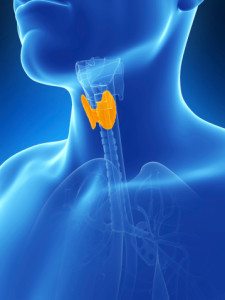
An underactive thyroid (hypothyroid in a medical context) refers to when the gland doesn’t produce enough thyroid hormone. Hashimoto’s Thyroiditis (an autoimmune disease) is by far the most common form of hypothyroidism in the Western world.
In almost all cases hypothyroidism is the result of inadequate T4 production, rather than inadequate T3. Conventional diagnosis relies on TSH and T4 blood tests, however there’s good reason to believe those tests alone are inadequate.
Left untreated, an underactive thyroid will lead to a host of health problemsincluding weight gain, hair loss, fatigue, poor memory and feeling unusually cold.
Conventional treatment for an underactive thyroid is with the hormone levothyroxine (LT4 or Synthroid). It works by replacing the T4 that is not being naturally produced, and is the most effective treatment for this condition.
Summary: The thyroid gland is fundamental to many metabolic processes. An underactive thyroid refers to when it doesn’t produce enough thyroid hormone.
Diet alone cannot cure hypothyroidism
Food on its own cannot cure or independently treat a diagnosed case of hypothyroidism.
Hormone replacement therapy with prescription medication, such as LT4, is necessary to restore thyroid function. That’s why LT4 is absolutely essential for any health care system.
In saying that, if you have underlying nutrient deficiencies or food intolerance that remains untreated, LT4 becomes a bandaid that doesn’t treat the root problem.
It’s important to note that if you use LT4, take it before or well outside of meal times. Absorption of the T4 hormone is greatly reduced if consumed alongside food, especially soy, high-fibre foods and coffee (2).
Summary: There is no one food or diet that can correct an underactive thyroid on its own. Thyroid hormones must be replaced through medication.
Iodine and thyroid function
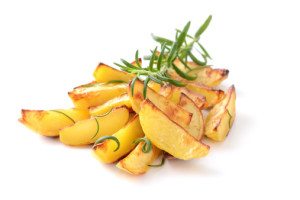 Iodine is an essential trace element that all living organisms need.
Iodine is an essential trace element that all living organisms need.
Our thyroid gland requires iodine to produce thyroid hormones. For that reason, a deficiency in iodine can lead to an underactive thyroid.
However, a lack of iodine is rarely the cause of hypothyroidism in developed countries where it is abundant in the food supply (3). Nevertheless, including iodine-rich foods in your diet is a good idea to be safe.
Navy beans, potatoes, eggs, cow’s milk and iodised salt are great food sources of iodine, although levels often depend on iodine content in the soil. Seafood is also iodine-rich as marine animals can concentrate iodine from seawater.
Note that if you have Hashimoto’s thyroiditis (strong majority of all hypothyroidism cases) then speak with your doctor before increasing iodine intake. It can be helpful, but in particular circumstances an increase in iodine can actually irritate the thyroid.
Iodine supplements are unnecessary in most cases
The World Health Organization (WHO) deems a population iodine deficient if urine concentration levels are less than 100 microgram/L.
Americans had a median level of 160 microgram/L in 2003-2004 (4), while Australians were at 124 microgram/L in 2011-2012. Most developed nations are also well above the deficiency level, which is why iodine-related hypothyroidism is so uncommon.
To ensure rates remain low, more than 100 countries have adopted mandatory iodization of all food-grade salt or bread. Note this process isn’t mandatory in the US, but more than half of all salt sold there does contain added iodine (5, 6).
Therefore, if you eat a healthy diet that contains some iodine-rich foods, it is highly likely you consume sufficient amounts of iodine. Supplemental iodine is not recommended for the general public, and has actually been shown to cause further thyroid dysfunction in some instances (7).
The big exception to this rule is if you are pregnant or breastfeeding. Iodine requirements increase by more than 60% because the developing fetus or infant requires iodine too. Women who fall into this category should definitely be supplementing with iodine, as per the World Health Organisation’s recommendations.
Summary: As iodine is required for thyroid hormone production, ensure your diet contains foods naturally rich in iodine (but if you have Hashimoto’s then check first with your doctor). Unless you are pregnant or breastfeeding, iodine supplements probably won’t be beneficial.
Supplemental selenium is not warranted and can have side effects
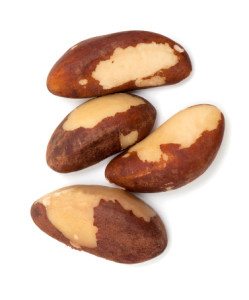 There is a theory that low selenium levels contribute to hypothyroidism through different mechanisms related to iodine.
There is a theory that low selenium levels contribute to hypothyroidism through different mechanisms related to iodine.
But a 2013 Cochrane review of the research concluded evidence is lacking to definitively support or refute the use of selenium supplements (8).
So the benefits remain unclear, but the known side-effects of selenium supplementation include digestive issues, hair loss, fatigue, and irritability. It may even greatly increase the risk of prostate cancer in men (9).
It’s fair to say the risks outweigh the benefits at this stage.
Additionally, those with a low iodine status who supplement selenium may in fact aggravate hypothyroidism. For this reason it’s best to stick with selenium-rich foods like Brazil nuts, mushrooms, meat and fish, which are far less potent than supplements.
Summary: Be sure to include selenium-rich foods in your diet, but selenium supplements are unproven to help and linked with several health issues.
Cruciferous vegetables as part of an underactive thyroid diet
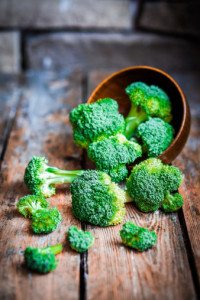 Goitrogens are naturally occurring substances that can potentially inhibit thyroid production (10).
Goitrogens are naturally occurring substances that can potentially inhibit thyroid production (10).
Vegetables from the cruciferae family are known goitrogens. They include brussels sprouts, broccoli, bok choy, cauliflower, cabbage, kale and more.
In theory then, eating these vegetables would aggravate an underactive thyroid and should be largely avoided. But this is only the case if you are iodine deficient or you consume ridiculously large quantities.
Raw cabbage was very problematic in rats when it made up a whopping 33% of their diet (11). One lady also managed to put herself into a coma by eating 1-1.5 kgs of raw bok choy daily (12).
Assuming you don’t eat phenomenal amounts of raw cruciferous vegetables, you are most likely safe. Frequent intake will only aggravate issues if your iodine intake is poor or you have a goiter.
Additionally, cooking cruciferous vegetables and other foods containing goitrogens are thought to greatly reduce its potential impact. A small study in 10 subjects showed that 150 g (5 oz) per day of cooked brussels sprouts for four weeks straight had no negative effects on thyroid function (13).
As cruciferous vegetables are so nutrient dense, it’s certainly not recommended to cut them out of your diet completely. Rather, ensure you cook them well and that your iodine intake is adequate.
Summary: If you don’t have a goiter or low iodine levels, cruciferous vegetables are safe when cooked well and eaten in regular amounts. The risk only outweighs the benefit if they are consumed in ridiculously large quantities and/or raw.
Limit or eliminate gluten for a hypothyroid diet
 Gluten is a protein found in grain and wheat that is not well-digested by around 6% of people.
Gluten is a protein found in grain and wheat that is not well-digested by around 6% of people.
While it’s fair to say the “gluten-free movement” has gotten out of hand, those with genuine gluten issues are at an increased risk for many health conditions (such as fibromyalgia) if they continue to consume it.
And numerous studies have shown a strong link between so-called gluten sensitivity (as well as celiac disease) and hypothyroidism.
For those hypersensitive to gluten, it is thought their immune system can confuse components of gluten with thyroid tissue. The immune system then mistakenly attacks and damages the thyroid gland, characteristic of Hashimoto’s thyroiditis. In fact, around 16% of those with celiac disease have antibodies that attack the thyroid (14).
Going by this theory, an individual with Hashimoto’s will not improve unless gluten is removed from the diet.
I explain it here in this video:
Many studies have found that a gluten-free diet reduces the number of antithyroid antibodies, which is favourable for treatment and in preventing new issues (15, 16, 17). However, there are also good studies that found no improvement (14, 18, 19, 20).
It would be reaching to say that gluten definitively aggravates an underactive thyroid, but at the same time it could very well play a part. The honest truth is we don’t know.
Therefore, if you have an underactive thyroid it’s important to get tested for celiac disease first thing. And if you have a family history of autoimmune disease, or you want to play it extra safe, then eliminate gluten from your diet.
Gluten-containing foods do not offer any unique nutrients that you can’t get from other foods sources anyway.
If you don’t have symptoms to gluten and don’t feel any different on a gluten-free diet, then it’s likely not a problem. Weigh up the social aspect vs the health aspect and go from there.
I’d personally only have gluten-foods as a treat.
Summary: There appears to be a link between gluten intolerance (or celiac disease) and hypothyroidism. However, the favourable effects of a gluten-free diet are inconsistent at best, so recommendations depend largely on an individual’s medical history and dietary preferences.
Desiccated thyroid is not always better
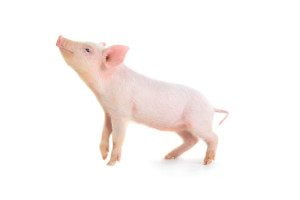 Some alternative health advocates recommend desiccated thyroid (ground up pork thyroid) instead of the conventional LT4 drug because it’s “natural”.
Some alternative health advocates recommend desiccated thyroid (ground up pork thyroid) instead of the conventional LT4 drug because it’s “natural”.
Aside from the huge flaws in assuming natural is always better than artificial, the problem is that desiccated thyroid contains a mix of T4 + T3 hormones. Trials using a mix of T4 + T3 have found it is, at best, equally as effective as LT4 treatment (21, 22, 23).
Combination treatment is typically used as a backup for those who do not respond favourably or feel unwell with regular LT4 treatment. To be fair, study participants tend to report better tolerance and preference of desiccated thyroid over LT4 (24).
Anecdotally, many desiccated thyroid users swear by it. For many it can treat symptoms effectively without the bad side effects of LT4. So desiccated thyroid has its place as an alternate treatment, but it’s certainly not better than conventional.
Supplements like desiccated thyroid are also not tightly regulated for dose or quality. Even though they are FDA regulated, supplements aren’t subject to the same strict safety and effectiveness requirements that drugs are.
In fact, a study on “thyroid support” supplements found that half of brands contain a low range of T4, while 1 in 10 contained no T4 at all.
In other words, taking desiccated thyroid comes with more risk for potentially no extra benefit than standard LT4. You will need to do some trial and error with your doctor to find out what is best for you.
Summary: Studies show desiccated thyroid supplements have no benefit over conventional LT4 treatment, and pose more risks. However, anecdotal reports indicate that desiccated thyroid is much better tolerated and can still be an effective form of hormone replacement therapy for some.
Is there a particular thyroid diet for weight loss?
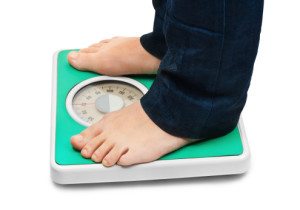 An underactive thyroid can make it extremely difficult to lose weight, especially if your diet is poor.
An underactive thyroid can make it extremely difficult to lose weight, especially if your diet is poor.
For this reason it’s critical to develop eating habits that are supportive of a healthy weight… not unlike regular weight loss advice (25).
The only difference is the thyroid must first be treated with proper medication. Once your hormone levels have been corrected, you can lose weight just like anybody else.
That means eating plenty of whole foods that you enjoy, increasing protein intake, cutting down on junk food products, and being more active where possible.
If you’re certain that a consistently healthy diet and regular physical activity have not helped your situation, you may want to consider trialling the Autoimmune Protocol diet (AIP).
Summary: There is no particular thyroid diet for weight loss, although I have created a meal plan as a guide. Once thyroid levels have been corrected with medication, you can then lose weight like anybody else.
An underactive thyroid diet plan

This brief diet plan below summarises what has been covered for treating an underactive thyroid:
Do eat:
- Foods rich in iodine such as iodised salt, seafood, potatoes, eggs and navy beans.
- Cruciferous vegetables in reasonable amounts, as long as they are cooked well.
- A diet high in protein, which helps to curb appetite and keep you feeling full. That includes dairy foods, eggs, legumes and seafood.
Don’t eat:
- Any food when you take LT4 medication as this can inhibit absorption.
- Iodine supplements unless under the guidance of your doctor (especially if you are pregnant/breastfeeding).
- Selenium supplements unless under the guidance of your doctor.
- Gluten-containing foods often, if at all. There seems to be a strong link between Hashimoto’s and non-celiac gluten sensitivity. You should always get tested for celiac disease, but this requires you take a gluten challenge.
- Desiccated thyroid supplements unless synthroid is giving you unpleasant side-effects.
- Anecdotal reports suggest caffeine intake should be limited to less than 300 mg per day (2-3 regular coffees) as large amounts can aggravate the thyroid
Summary and the next step…
Hypothyroidism can be a serious condition if not managed properly.
Presuming you’ve experienced the symptoms and had your TSH tested professionally, you must be prepared to make some dietary changes (recommend doing this under the guidance of a health professional).
From what current research can tell us, the best diet for an underactive thyroid is one that contains whole foods, is high in protein, and naturally rich in iodine and selenium. That means eating more nuts, vegetables, and seafood, and only using supplements if natural foods are not an option.
Most patients report improvement with a thyroid supplement too, but if you consistently eat a healthy and wholesome diet they are unnecessary. If you still want to try one however (under the supervision of your doctor). It contains both selenium and iodine for thyroid health, as well as vitamin B12 for improved energy levels. Additionally, it is one of the few available that is 100% vegetarian.
Cabbage, broccoli and other related vegetables are safe if cooked well (and you don’t have goiter), while gluten is best limited or cut out completely- depending on your tolerance.
If you’ve been doing all the right things and still feel your situation is not improving, you may want to consider trialling the Autoimmune Protocol diet (AIP).
Just keep in mind that what you eat is only one piece of the thyroid puzzle.
Complete management of an underactive thyroid includes hormone replacement therapy (Synthroid or desiccated thyroid), regular exercise (cardio and strength), adequate sleep and reducing stress.
It’s not easy, but it’s doable. One step at a time.


Out Of Topic Show Konversi KodeHide Konversi Kode Show EmoticonHide Emoticon